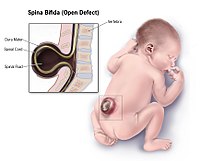
Photo from wikipedia
Abstract Pediatric brain tumor survivors (PBTSs) may experience impairment in executive functions and social competence, but their interrelation is not well understood. This study aimed to address the specificity of… Click to show full abstract
Abstract Pediatric brain tumor survivors (PBTSs) may experience impairment in executive functions and social competence, but their interrelation is not well understood. This study aimed to address the specificity of this relationship. PBTSs (n = 91) were on average 11.21 years old, 5 years from diagnosis, and 48.4% female. One parent and PBTS completed the Social Skills Rating System (subscales: Cooperation, Assertiveness, Empathy, Self-Control, and Total), and parents also completed the Behavior Rating Inventory of Executive Function (General Executive Composite [GEC], Metacognition [MI], and Behavioral Regulation [BRI] indices) and the (Withdrawal scale). Based on proxy reports, more PBTSs had deficits in Cooperation, Assertiveness and Responsibility skills relative to normative data. MI was more consistently associated with parent reported social skills deficits than BRI. PBTSs reported fewer deficits in social skills relative to normative data across all scales; none of the correlations between PBTSs reported social skills and executive functions were significant. Time since diagnosis and proxy reported lower total social skills predicted greater withdrawal. These findings highlight the importance of assessing differential perspectives of PBTSs social competence, and that metacognitive strategies may bear particular importance for the social skills of PBTSs.
Journal Title: Applied Neuropsychology: Child
Year Published: 2018
Link to full text (if available)
Share on Social Media: Sign Up to like & get
recommendations!